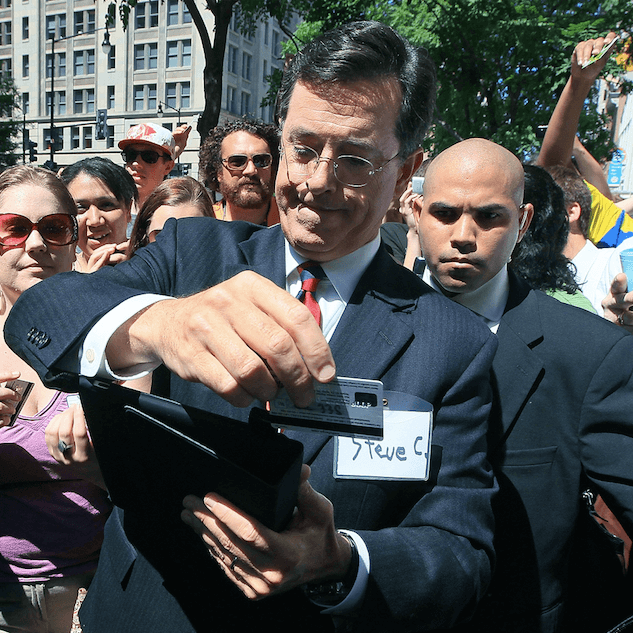If your Facebook feed is anything like mine, it’s dominated by people venting about campaign financing and how candidates’ respective “PACs” are destroying our democracy. But, if you’re not up to date on your Facebook caps lock trolling, you may be wondering, “What are PACs?”
This is the world of political action committees, known as PACs, and they are organizations that exist solely to help elect or defeat candidates. In short, it’s lobbyism at its finest.
Let’s see how many times I can use the acronym “PAC”
Going out on a limb: picture a PAC as the PacMan, of the famous ‘80s arcade game. PacMan goes around the maze, eating white pac-dots and with enough pac-dots, PacMan can eat the enemies, Blinky, Pinky, Inky and Clyde.
A PAC does the same thing. Instead of pac-dots, it eats money from donors and they can spend it on television ads, FedEx deliveries, flights, staff salaries—all that campaign overhead. Donors to PACs are usually businesses, unions, or other ideological interest groups that want to advocate for a particular candidate.
That PAC money has caps and regulations put in place by the Federal Elections Committee (FEC) and one of this stipulations is that donors can’t give as much as they want. The FEC makes sure that PACs can only accept up to $5,000 from any one individual. In turn, PACs can only give $5,000 to a candidate’s committee and up to $15,000 to the general party.
PACs can pretty much spend however much they want on other stuff, like: other candidates, the opposing party, costume parties and piñatas as long as the donors are aware.
As of 2009, there are approximately 4,600 different PACs. The 4,600 are a mixture of “Connected PACs,” “Non-connected PACs,” “Leadership PACs,” and “Super PACs.”
Connected PACs
Connected PACs raise their money from donors that are bosses of corporations, trade organizations, or labor unions. These guys directly give cheddar to the particular candidates and/or party for the obvious reason that they don’t want to be screwed in the next presidential cycle.
Some big connected PACs include: American Federation of Teachers, National Beer Wholesalers Association, and Boeing Corporation, just to name a few.
Non-connected PACs
Non-connected PACs are created to advocate for a particular issue or ideology.
Some examples of these types of non-connected, single issue PACs are: National Rifle Association, Committee for Hispanic Causes, and AmeriPAC: The Fund for a Greater America.
Leadership PACs
Leadership PACs are similar to non-connected PACs in that the actual politicians essentially create another pot in which they can put money for their campaigns. It’s just another avenue to bring in the cheddar.
Super PACs
Super PACs have become the most controversial of them all, surprisingly enough. Unlike the registered and regulated PACs, Super PACs can raise and spend incredible amounts of money with no limit.
The only catch is that they cannot give the money directly to the party or candidate. They can however, spend money on advertisements and virtually any other way that can influence people into voting a certain way.
These Super PACs also have the anonymity feature added, in which donors don’t have to say that they are donating. This comes in clutch for people that are not trying to stir the pot, but still want to get politically involved. Free speech at its finest, or dirtiest, depending on your disposition.
If you’re not first, you’re last
In the end, the United States only has room for one president, as the saying goes, “If you’re not first, you’re last.” Therefore, a safe question to ask is, where do all those donated funds go when the candidates leave the race?
Scott Walker, a Republican candidate and current governor of Wisconsin, recently left the race after substantially dropping in the polls. Former Texas Governor Rick Perry also dropped out, but much earlier in the game.
Although it’s rare to have excess campaign money, sometimes there is a surplus of funds after the candidate drops out. After all the debts are paid, this extra money can be used for pretty much anything—except personal use. (Leadership PACs, however, are slightly fishier, in that the candidate may be able to dip into that money for personal use, since it’s their own PAC.)
PACs can hold on to the cash for next election cycle, put more ads up against the opposing party, conferences, galas, events, anything. Connected PACs often send their money to other candidates or a party, as long as they adhere to the spending limits. Everything is looked at in a case-by-case manner.
Do I get a refund?
In regards to Walker and Perry’s associated super PACs, these organizations claimed that they will be giving their money back to their donors, especially in Perry’s case. Perry dropped out pretty quickly despite raising over $13 million. Darwin Deason, a tech billionaire from Texas, has been pretty vocal gettin’ his money back after dropping $5 million into Perry’s super PAC. Deason apparently doesn’t care how sleek Perry’s eyeglasses look.
In the end however, it’s buyer beware once you decide to cut your check and send it over to a PAC.
Have something to add to this story? Comment below or join the discussion on Facebook.
Header image: Getty










































Kevin G
October 16, 2015 at 4:31 pm
http://41.media.tumblr.com/db172a16db18e455d0759d85cbb7e611/tumblr_inline_nw82b0zmIs1qkil9f_1280.png Just sayin’.